广州版五年级英语下册重要考点归纳
- 格式:docx
- 大小:41.49 KB
- 文档页数:7
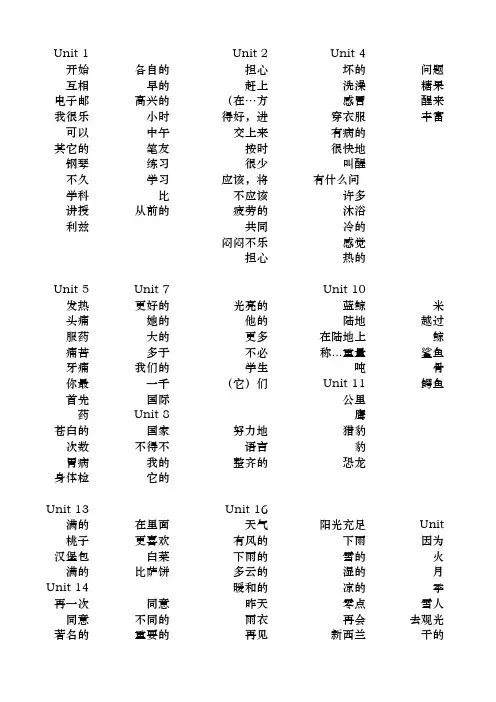
Unit 1Unit 2 Unit 4开始各自的担心坏的问题互相早的赶上洗澡糖果电子邮件高兴的(在…方面)做感冒醒来我很乐意小时得好,进展好穿衣服丰富可以中午交上来有病的其它的笔友按时很快地钢琴练习很少叫醒不久学习应该,将要有什么问题吗学科比不应该许多讲授从前的疲劳的沐浴利兹共同冷的闷闷不乐的感觉担心热的Unit 5 Unit 7 Unit 10发热更好的光亮的蓝鲸米头痛她的他的陆地越过服药大的更多在陆地上鲸痛苦多于不必称...重量鲨鱼牙痛我们的学生吨骨你最好.... 一千 (它)们Unit 11 鳄鱼首先 国际的公里药Unit 8 鹰苍白的国家努力地猎豹次数不得不语言豹胃病我的整齐的恐龙身体检查它的Unit 13 Unit 16满的在里面天气阳光充足的Unit 17 桃子更喜欢有风的下雨因为汉堡包白菜下雨的雪的火满的比萨饼多云的湿的月Unit 14 暖和的凉的季再一次同意昨天零点雪人 (复数)同意不同的雨衣再会去观光著名的重要的 菜单再见新西兰干的种类餐馆穿上滑雪持续猪肉海产食物听起来有雾的地方将;会谷类度伞雪人奇怪王后温度观光果菜类西方的白雪公主同意Unit 1.Unit 2晚饭后很多家庭作业在学校擅长于……在学校食堂迟到乘校车担心……乘地铁赶上……做某人的作业在…方面做得好互相发邮件喜欢做某事一小时睡觉以前的学生按时交作业早起看起来很累半小时打电脑游戏吃午饭在课堂上睡觉互相帮助对……说话帮某人做某事做运动像你一样太多需要做某事在卧室里工作别的科目笔友弹钢琴练习做某事练习弹钢琴学中文漂亮的女孩想要做某事Unit 4 Unit 5 .短语吃早餐晚饭后觉得病了放学后觉得累很多感觉舒服大量的蔬菜穿衣服在学校起床觉得饿/累/冷/热回去睡觉很长时间洗澡给某人进行一次体检感冒早睡发烧交某人的作业头痛有许多作业牙痛疼痛胃疼多少水果许多水果看起来很苍白许多蔬菜按时看医生留在家待在床上吃药休息一天三次很晚步行去学校Unit 7 Unit 81080八点差一刻乘巴士去上学来自……更美丽工作努力的搬到有更难的工作要做大得多不得不离你家更近我认为是这样。
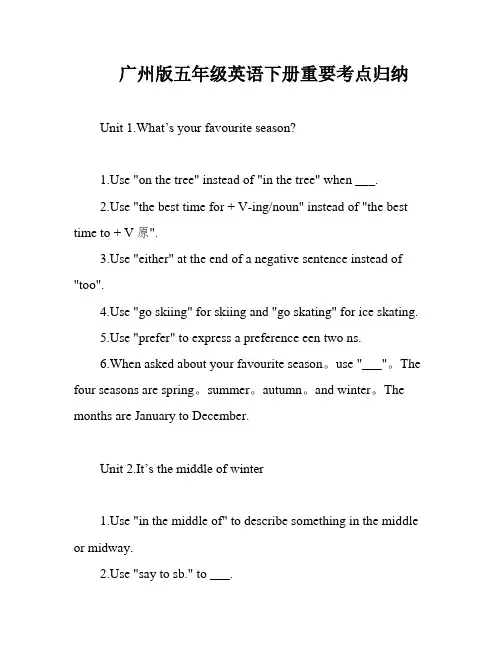
广州版五年级英语下册重要考点归纳Unit 1.What’s your favourite season?e "on the tree" instead of "in the tree" when ___.e "the best time for + V-ing/noun" instead of "the best time to + V原".e "either" at the end of a negative sentence instead of "too".e "go skiing" for skiing and "go skating" for ice skating.e "prefer" to express a preference een two ns.6.When asked about your favourite season。
use "___"。
The four seasons are spring。
summer。
autumn。
and winter。
The months are January to December.U nit 2.It’s the middle of wintere "in the middle of" to describe something in the middle or midway.e "say to sb." to ___.e "for" to explain the reason for a visit or n.e "how" to ask about the method or way of doing something.e "be from" or "come from" to ___.e "too。
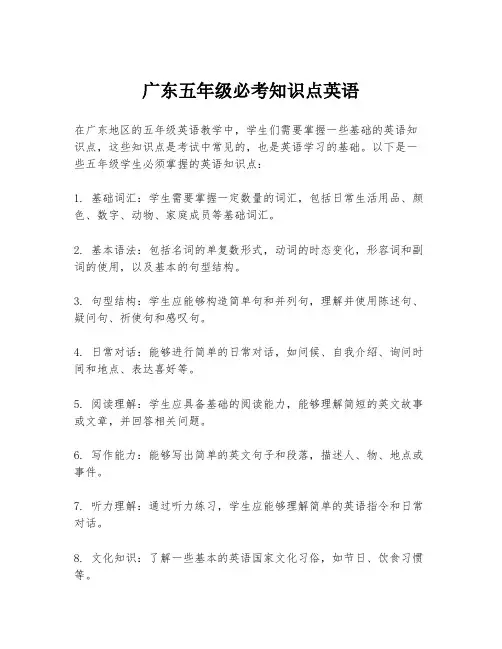
广东五年级必考知识点英语
在广东地区的五年级英语教学中,学生们需要掌握一些基础的英语知识点,这些知识点是考试中常见的,也是英语学习的基础。
以下是一些五年级学生必须掌握的英语知识点:
1. 基础词汇:学生需要掌握一定数量的词汇,包括日常生活用品、颜色、数字、动物、家庭成员等基础词汇。
2. 基本语法:包括名词的单复数形式,动词的时态变化,形容词和副词的使用,以及基本的句型结构。
3. 句型结构:学生应能够构造简单句和并列句,理解并使用陈述句、疑问句、祈使句和感叹句。
4. 日常对话:能够进行简单的日常对话,如问候、自我介绍、询问时间和地点、表达喜好等。
5. 阅读理解:学生应具备基础的阅读能力,能够理解简短的英文故事或文章,并回答相关问题。
6. 写作能力:能够写出简单的英文句子和段落,描述人、物、地点或事件。
7. 听力理解:通过听力练习,学生应能够理解简单的英语指令和日常对话。
8. 文化知识:了解一些基本的英语国家文化习俗,如节日、饮食习惯等。
9. 语音和发音:掌握英语的基本发音规则,能够正确发音单词和句子。
10. 词汇运用:能够在不同的语境中正确使用词汇,包括同义词和反
义词的运用。
结尾:
掌握这些知识点不仅能够帮助学生在考试中取得好成绩,更能为他们
的英语学习打下坚实的基础。
家长和老师应鼓励学生通过多种方式学
习英语,如阅读英文书籍、观看英语节目、参与英语角等,以提高他
们的语言运用能力。
记住,学习英语是一个长期的过程,需要持续的
努力和实践。
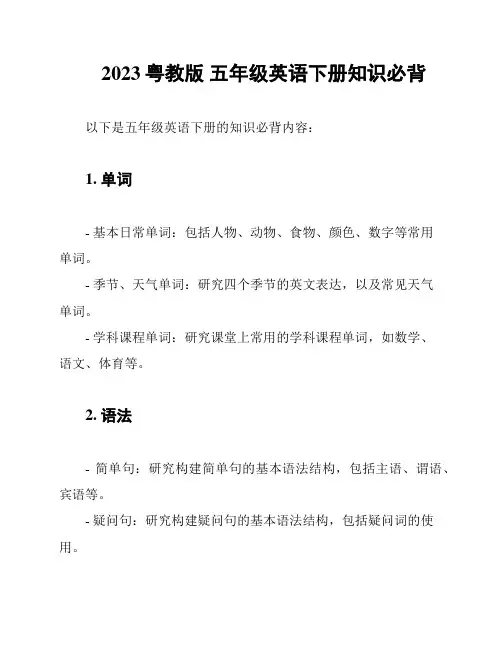
2023粤教版五年级英语下册知识必背以下是五年级英语下册的知识必背内容:
1. 单词
- 基本日常单词:包括人物、动物、食物、颜色、数字等常用
单词。
- 季节、天气单词:研究四个季节的英文表达,以及常见天气
单词。
- 学科课程单词:研究课堂上常用的学科课程单词,如数学、
语文、体育等。
2. 语法
- 简单句:研究构建简单句的基本语法结构,包括主语、谓语、宾语等。
- 疑问句:研究构建疑问句的基本语法结构,包括疑问词的使用。
- 否定句:研究构建否定句的基本语法结构,包括否定词的使用。
3. 句型
- 四会句型:研究四个基本句型,包括陈述句、疑问句、祈使句和感叹句。
- 日常用语句型:研究日常生活中常用的句型,如问候语、道歉语、感谢语等。
4. 阅读理解
- 阅读理解:研究阅读短文并回答相关问题的能力,包括理解短文中的关键信息、推理等。
5. 写作技巧
- 描述事物:研究用英语描述人物、动物、物品等的基本写作技巧。
- 书写句子:研究正确书写并连贯句子的基本写作技巧。
以上是五年级英语下册的知识必背内容,请同学们认真学习并掌握。
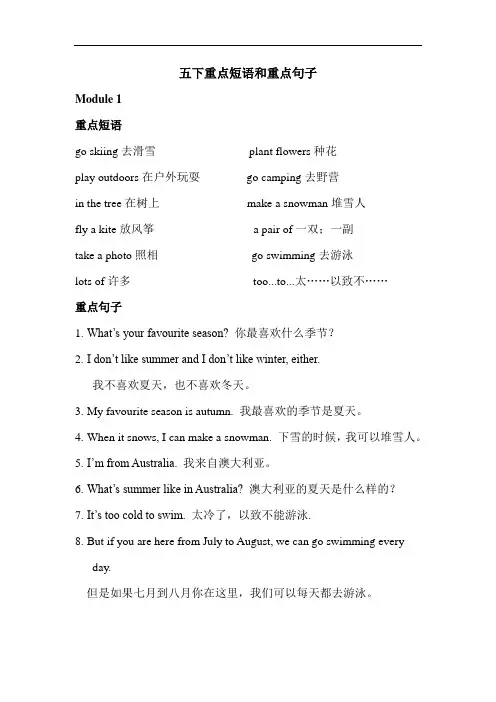
五下重点短语和重点句子Module 1重点短语go skiing去滑雪plant flowers种花play outdoors在户外玩耍go camping去野营in the tree在树上make a snowman堆雪人fly a kite放风筝 a pair of一双;一副take a photo照相go swimming去游泳lots of许多too...to...太……以致不……重点句子1.What’s your favourite season? 你最喜欢什么季节?2.I don’t like summer and I don’t like winter, either.我不喜欢夏天,也不喜欢冬天。
3.My favourite season is autumn. 我最喜欢的季节是夏天。
4.When it snows, I can make a snowman. 下雪的时候,我可以堆雪人。
5.I’m from Australia. 我来自澳大利亚。
6.What’s summer like in Australia? 澳大利亚的夏天是什么样的?7.It’s too cold to swim. 太冷了,以致不能游泳.8.But if you are here from July to August, we can go swimming everyday.但是如果七月到八月你在这里,我们可以每天都去游泳。
重点短语visit the museum参观博物馆visit a farm参观农场have a good time过得愉快have a sports meeting开运动会go to the school open day参加学校开放日go shopping去购物go running去跑步go mountain climbing爬山go boating去划船go horse-riding去骑马take a walk散步play table tennis打乒乓球重点句子1.What’s the date today? 今天是几月几日?2.We are going to see a film tomorrow evening.明天晚上我们打算去看电影。
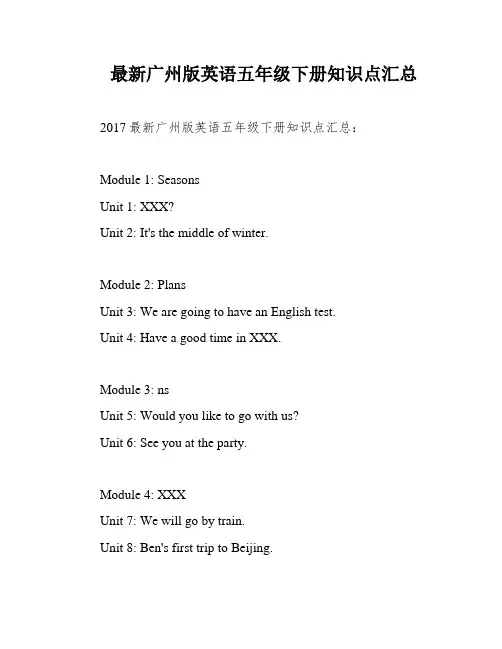
最新广州版英语五年级下册知识点汇总2017最新广州版英语五年级下册知识点汇总:Module 1: SeasonsUnit 1: XXX?Unit 2: It's the middle of winter.Module 2: PlansUnit 3: We are going to have an English test.Unit 4: Have a good time in XXX.Module 3: nsUnit 5: Would you like to go with us?Unit 6: See you at the party.Module 4: XXXUnit 7: We will go by train.Unit 8: Ben's first trip to Beijing.Module 5: SafetyUnit 9: Be careful.Unit 10: How to stay safe?Module 6: nsUnit 11: Can you tell me the way?Unit 12: I know a shortcut.Module 1: SeasonsUnit 1: XXX?Vocabulary:colorful。
prefer。
winter。
either。
autumn。
ski。
plant。
camp。
go camping。
go skiing。
plant flowers。
play outdoors。
look at。
in the tree。
really love。
like swimming。
make a snowman。
fly a kite。
XXX.Key XXX:1.XXX。
- XXX.2.What season do you like best。
- I like spring best.Note: "in the tree" and "on the tree" can both mean "在树上"in Chinese。
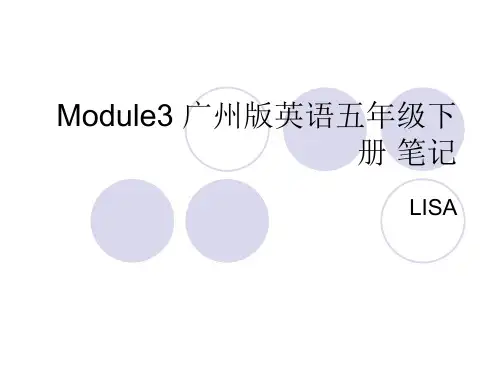
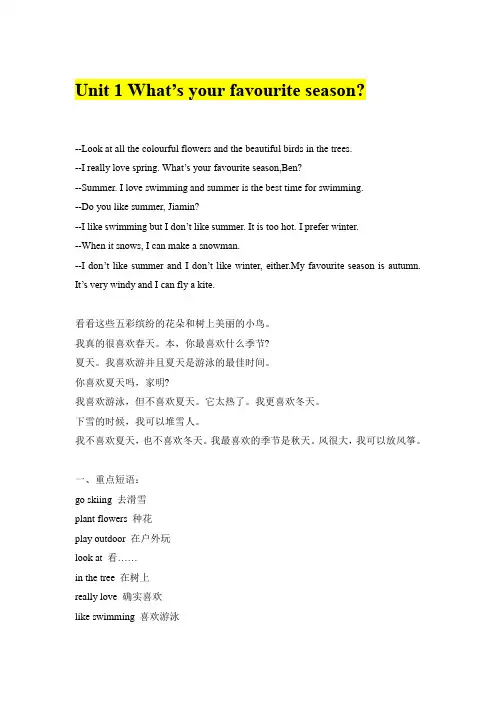
Unit 1 What’s your favourite season?--Look at all the colourful flowers and the beautiful birds in the trees.--I really love spring. What’s your favourite season,Ben?--Summer. I love swimming and summer is the best time for swimming.--Do you like summer, Jiamin?--I like swimming but I don’t like summer. It is too hot. I prefer winter.--When it snows, I can make a snowman.--I don’t like summer and I don’t like winter, either.My favourite season is autumn. It’s very windy and I can fly a kite.看看这些五彩缤纷的花朵和树上美丽的小鸟。
我真的很喜欢春天。
本,你最喜欢什么季节?夏天。
我喜欢游并且夏天是游泳的最佳时间。
你喜欢夏天吗,家明?我喜欢游泳,但不喜欢夏天。
它太热了。
我更喜欢冬天。
下雪的时候,我可以堆雪人。
我不喜欢夏天,也不喜欢冬天。
我最喜欢的季节是秋天。
风很大,我可以放风筝。
一、重点短语:go skiing 去滑雪plant flowers 种花play outdoor 在户外玩look at 看……in the tree 在树上really love 确实喜欢like swimming 喜欢游泳go skiing 去滑雪make a snowman 堆雪人fly a kite 放风筝二、重点句型:1. --What’s your favourite season?--My favourite season is summer.2. –What season do you like best?--I like spring best.三、重点分析:1. in the tree 和on the tree都可以表示“在树上”;in the tree表示外来的东西在树上;on the tree表示树本身的东西。
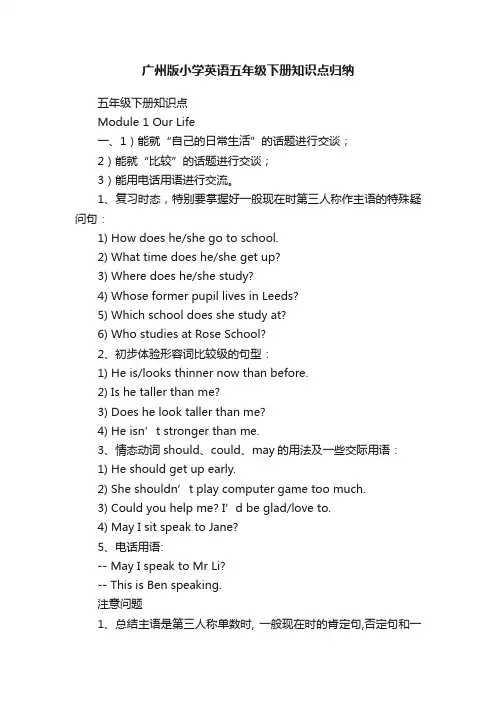
广州版小学英语五年级下册知识点归纳五年级下册知识点Module 1 Our Life一、1)能就“自己的日常生活”的话题进行交谈;2)能就“比较”的话题进行交谈;3)能用电话用语进行交流。
1、复习时态,特别要掌握好一般现在时第三人称作主语的特殊疑问句:1) How does he/she go to school.2) What time does he/she get up?3) Where does he/she study?4) Whose former pupil lives in Leeds?5) Which school does she study at?6) Who studies at Rose School?2、初步体验形容词比较级的句型:1) He is/looks thinner now than before.2) Is he taller than me?3) Does he look taller than me?4) He isn’t stronger than me.3、情态动词should、could、may的用法及一些交际用语:1) He should get up early.2) She shouldn’t play computer game too much.3) Could you help me? I’d be glad/love to.4) May I sit speak to Jane?5、电话用语:-- May I speak to Mr Li?-- This is Ben speaking.注意问题1、总结主语是第三人称单数时, 一般现在时的肯定句,否定句和一般疑问句的变化, 例如:I eat dinner at six. He eats dinner at six too.I don’t eat dinner at six. He doesn’t eat dinner at six either.Do you eat dinner at six? Does he eat dinner at six?2、总结主语是第三人称单数时, 一般现在时的特殊疑问句形式, 如:What time does he get up? He gets up at six.Where does she live? She lives in Renmin Road.How does he go to work?He goes to work by bus.Who hands in the homework? Jiamin does.Whose friend practices the piano? Jane’s friend.Which school does she study at ? She studies at No. 2 School?3. 当主语是第三人称单数时, 一般现在时的动词的变化的规律:1) 一般情况加-s,例如:visit – visits tell – tells work – works wave – waves2) 以s, x, sh, ch结尾的动词, 加-es,例如:wash – washes watch – watches catch – catches3) 以辅音字母加y结尾的动词,改y为i加-es,例如:fly – flies study – studies4) 部分以o结尾的动词加-es,例如:go – goes do – does5) 特殊情况have – hasUnit 11、for an hourfor 表示时间的长度,例如:for two yearhalf an hour 半小时an hour and a half 一个半小时2、注意句型:Could you …?I’d be glad to. / I’d love to.3、比较级句型:She is older than me.She is one year older than me.4、keep the rule 守规律;守规则Unit 21、电话用语:May / Could / Can I speak to …This is … speaking. / Speaking.Who’s this / that?2、He looks thinner now than before. 他现在看起来比以前瘦很多。

广州英语五年级知识点广州英语五年级的学习内容涵盖了基础词汇、句型结构、语法规则、阅读理解以及写作技巧等多个方面。
以下是一些关键的知识点,帮助学生更好地掌握五年级的英语课程。
词汇学习五年级的词汇学习更加注重实用性和多样性。
学生需要掌握日常生活中的高频词汇,如家庭成员、学校物品、食物、颜色、动物等。
此外,还会学习一些描述性词汇,如形容词和副词,以及一些动词的过去式和现在进行时。
句型结构在句型结构方面,学生将学习如何构造简单句、并列句和复合句。
例如,学习使用“and”、“but”等连词来连接句子,形成并列句;使用“because”、“so”等从属连词来引导原因、结果等从句。
语法规则语法是英语学习中非常重要的部分。
五年级学生需要掌握的语法点包括:- 名词的单复数形式- 动词的时态,如一般现在时、一般过去时和现在进行时- 形容词和副词的比较级和最高级- 代词的使用,包括人称代词、物主代词等- 疑问句的构成,如一般疑问句和特殊疑问句阅读理解阅读理解能力的培养是五年级英语教学的重点之一。
学生将阅读不同题材的文章,如故事、说明文、应用文等,并学会从文章中提取信息、理解主旨大意以及做出推理判断。
写作技巧写作是表达思想的重要方式。
五年级学生将学习如何写日记、书信、故事等不同类型的文章。
在写作过程中,学生需要学会如何组织文章结构,使用恰当的时态和语态,以及如何进行有效的段落划分。
听力训练听力是语言学习中不可或缺的一部分。
学生将通过听英语故事、对话、歌曲等来提高听力理解能力。
同时,听力练习也有助于学生更好地掌握语音和语调。
口语表达口语能力的培养同样重要。
学生将通过角色扮演、小组讨论、演讲等活动来锻炼口语表达能力。
此外,学生还需要学会在不同场合使用恰当的语言和表达方式。
总结五年级的英语学习是一个全面提升的过程,不仅需要掌握基础知识,还要培养听说读写的综合能力。
通过不断的练习和应用,学生可以逐步提高英语水平,为将来的深入学习打下坚实的基础。
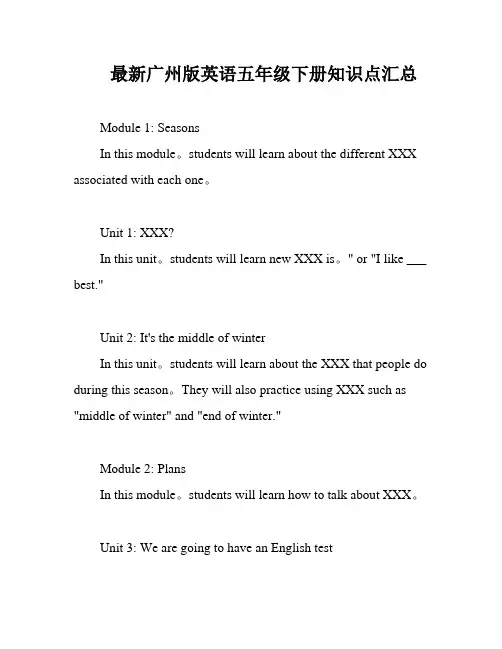
最新广州版英语五年级下册知识点汇总Module 1: SeasonsIn this module。
students will learn about the different XXX associated with each one。
Unit 1: XXX?In this unit。
students will learn new XXX is。
" or "I like ___ best."Unit 2: It's the middle of winterIn this unit。
students will learn about the XXX that people do during this season。
They will also practice using XXX such as "middle of winter" and "end of winter."Module 2: PlansIn this module。
students will learn how to talk about XXX。
Unit 3: We are going to have an English testIn this unit。
students will learn how to express future plans using the phrase "going to." They will also XXX。
Unit 4: Have a good time in HainanIn this unit。
students will learn about the tropical island of Hainan and the activities that people do there。
They will also practice using the XXX ing trips and events。
最新广州版英语五年级下册知识点汇总最新广州版英语五年级下册知识点汇总知识点概要:Module 1 SeasonsUnit 1 What’s your favourite season?Unit 2 It’s the middle of winterModule 2 PlansUnit 3 We are going to have an English testUnit 4 Have a good time in HainanModule 3 InvitationsUnit 5 Would you like to go with us?Unit 6 See you at the partyModule 4 TravelUnit 7 We will go by trainUnit 8 Ben’s first trip to BeijingModule 5 SafetyUnit 9 Be carefulUnit 10 How to stay here?Module 6 DirectionsUnit 11 Can you tell me the way?Unit 12 I know a short cut以下为详细内容▼Module 1 SeasonsUnit 1 What’s your favourite season?一、单词短语colourful 多彩的prefer 选择;宁愿winter 冬天either 也autumn 秋天ski 滑雪plant 种植;植物camp 野营;营地go camping 去野营go skiing 去滑雪plant flowers 种花play outdoor 在户外玩look at 看…… in the tree 在树上really love 确实喜欢like swimming 喜欢游泳go skiing 去滑雪make a snowman 堆雪人fly a kite 放风筝favourite season最喜欢的季节二、重点句型:1. --What’s your favourite season?--My favourite season is summer.2. –What season do you like best?--I like spring best.三、重点分析:1. in the tree 和on the tree都可以表示“在树上”;in the tree表示外来的东西在树上;on the tree表示树本身的东西。
广州版小学英语五年级下册知识点归纳Module 1Our Life一、1)能就“自己的日常生活”的话题进行交谈;2)能就“比较”的话题进行交谈;3)能用电话用语进行交流。
1、复习时态 ,特别要掌握好一般现在时第三人称作主语的特殊疑问句:1)How does he/she go to school.2)What time does he/she get up?3)Where does he/she study?4)Whose former pupil lives in Leeds?5)Which school does she study at?6)Who studies at Rose School?2、初步体验形容词比较级的句型:1)He is/looks thinner now than before.2)Is he taller than me?3)Does he look taller than me?4)He isn ’ t stronger than me.3、情态动词 should、 could、may 的用法及一些交际用语:1)He should get up early.2)She shouldn ’3)Could you help me? I ’ d be glad/love to.4)May I sit speak to Jane?5、电话用语 :--May I speak to Mr Li?--This is Ben speaking.注意问题1、总结主语是第三人称单数时 , 一般现在时的肯定句 ,否定句和一般疑问句的变化, 例如:I eat dinner at six.I don ’ t eat dinner at six. Do you eat dinner at six?He eats dinner at six too.He doesn ’ t eat dinner at six either. Does he eat dinner at six?2、总结主语是第三人称单数时, 一般现在时的特殊疑问句形式, 如:What time does he get up?He gets up at six.Where does she live?She lives in Renmin Road.How does he go to work?He goes to work by bus.Who hands in the homework?Jiamin does.Whose friend practices the piano?Jane’ s friend.Which school does she study at ?She studies at No. 2 School? 3. 当主语是第三人称单数时, 一般现在时的动词的变化的规律:1)一般情况加 -s,例如:visit –visits tell –tells work –works wave –waves 2) 以 s,x, sh, ch尾的 , 加-es,例如:wash –washes watch –watches catch –catches3)以音字母加 y 尾的 ,改 y i 加-es,例如:fly –flies study –studies4)部分以 o 尾的加 -es,例如: go –goes do –does5)特殊情况 have –hasUnit 11、for an hourfor 表示的度 ,例如: for two yearhalf an hour半小an hour and a half一个半小2、注意句型:Could you⋯?I ’ d be gladto. / I’ d love to.3、比句型:She is older than me.She is one year older than me.4、keep the rule守律;守Unit 21、用 :May / Could / Can I speak to⋯This is⋯speaking. / Speaking.Who’ s this / that?2、He looks thinner now than before. 他在看起来比以前瘦很多。
教科版五年级下册基础知识汇总Unit !What's your favourite season?【重点单词】1.colourful多彩的 5.ski滑雪2.winter冬天 6.plant种植;植物3.either也7.camp野营:营地4.autumn秋天8.prefer选择,宁愿要【重点短语】I.go skiing去滑雪7.in the trees在树上2.plant flowers丰中花8.favourite season最喜欢的季节3.play outdoors在户外玩耍9.too hot太热4.go camping去野营10.make a snowman堆雪人5.colourful flowers多彩的花11.fly a kite放风筝6.beautiful birds 漂亮的鸟12.eat ice cream吃冰激凌【重点句子】1.-What’s your favourite season,Ben?本,你最喜玫什么季节?-Summer.夏天。
I)此问句用于湖问对方最喜欢付么季节。
2)答语为“(My favourite season is十)季节名称.”。
3)其中your是形容词性物主代词,意为“你的:你们的”。
4 )fav omite的意思是“最喜欢的”。
例如:-What’s your 臼vomite season, Mike?迈克,你最喜欢什么季节?-Winter.冬天。
2.1 love swimming and summer is the best time for swimming.我喜欢游泳,夏天是游泳最好的时候。
l)Ei11:t称十比川巳st time for+t9J词叫形式(十其他)明来描述某季节是做某活动最好的时候。
2)其中best意为“最好的”。
3)for是介词,后接动词ing形式。
例如:Winter is the best time for skiing.冬天是泪’雪最好的时候。
五年级英语下册重要考点Unit 1. What ’s your favourite season?1.in the tree(外来物在树上)on the tree (长在树上 )2.the best time to + V原the best time for +V-ing/名词3.I don’tlike summer, and I don’t like winter , either.too(用于肯定句)放句末“也”either (用于否定句)also --------------------放句中4. go skiing (去滑雪 )go skating (去溜冰 )5.prefer 更喜欢(用于两者之间做选择)6.--What’s your favourite season? 你最喜欢的季节是什么?答: My favourite season is +季节 .Season(季节):spring(春), summer(夏), autumn(秋),winter(冬) Month(月份):January, February, March, April, May, June,July, August, September, October, November, DecemberUnit 2. It ’s the middle of winter1.in the middle of⋯在⋯的中间 /中期eg: The park is in the middle of the city. 这座公园在城市的中间。
2.say to sb. 对某人说3.He is visiting me for the summer holidays.for 表示原因,由于在放假,所以来看我。
4.How do you have a summer holiday? (how 表示怎么、怎样 )5.I am from Astralia. ( be from = come from 来自 )eg: I am from China. = I come from China.6. too⋯ to ⋯(+V 原)太⋯以致不能⋯eg: It’s too cold to swim now.7.What’s summer like in Australia? 澳大利的夏天怎么样?(问天气)What’s⋯ like? ⋯怎么样?形容天气的形容词:hot, cold, warm, cool, wet, dry, windy, sunny, snowy, rainyUnit 3. We are going to have an English test1.问日期: --What’s the date today?--It ’s+日期 .2.问星期: -- What day is it today?--It ’s +星期 .3.日期的表达:月份 +the+序数词rd June the 23the +序数词 +of+ 月份the 23rd of June(写法: June 23rd) 4.基数词变序数词基数词序数词基数词序数词one first eleven eleventh two second twelve twelfth three third thirteen thirteenth four fourth fourteen fourteenth five fifth fifteen fifteenth six sixth sixteen sixteenth seven seventh twenty twentieth eight eighth twenty-one twenty-first nine ninth twenty-two twenty-second ten tenth twenty-three twenty-third基数词变序数词的口诀:基变序,有规律,词尾加上 th 一二三,单独记,八去(t eighth),九去 e(ninth), f 来把 ve 替 (five--fifth) ,ty 变成 tie(twenty--twentieth),若是遇到几十几,只变个位就可以。
(t wenty-one —twenty-first )5.on+具体日期 /星期(的早上、下午、晚上)th thEg : on June 11 ,on the morning of June 11 ,on Monday,on Monday afternoon6.Is there anything else important next month?Is there问, there is 答。
Yes, there is. / No, there isn’t.anything 用于否定、疑问句, something用于肯定句。
anything /something+形容词:一些⋯的东西(something interesting一些有趣的东西)Unit 4. Have a good time in Hainan1. 一般将来时的结构:be going to +V 原will +V 原plan to +V 原2. I am sure we will have a good time in Hainan.have a good time = have fun 玩得开心,过的愉快3. Next week we will travel in Hainan for five days.for+时间段:持续⋯.4. go for a picnic= go on a picnic= have a picnic 去野餐5. can’twait to +V 原迫不及待⋯6. 固定搭配: at night (在夜晚 )at noon (在中午 )Unit 5. Would you like to go with us?1. Would you like to +V 原 ..? (表示邀请 )你想不想⋯肯定回答: Yes, I ’d like/ love to...否定回答: Sorry, I am busy.⋯/2. plan to + V 原计划⋯3. That sounds great? 听起来很棒!(that 做主语看作是三单,sound要加 s)sound为感官动词,后加形容词。
感官动词还有:look, smell, feel, taste。
4. at the school gate 在学校门口(at后面加小地点)如: at school, at the library, at home, at the school meeting room等等Unit 6. See you at the party1. would like to +V 原想要⋯2.invite sb. to ⋯邀请某人去⋯3.all+可数名词复数 : 全部的⋯(all her friends and classmates )4.on this special day 在这特殊的一天( on 用于具体某一天)5. call me on+电话号码(me代词放中间)6. see you at the party 聚会上见7.四大说说: speak, say, tell, talkspeak+语言 eg: speak englishsay +内容eg: My mum says: “you should go to bed now”.tell sb. sth. 告诉某人某事(讲故事: tell a story)talk talk about sth. 谈论某事talk with sb. 和⋯谈论某事Unit 7. We will go by train1. Do you have any plans for the holiday? 你假期有什么计划吗?any 用于疑问句,后面加可数名词复数。
plan for the holiday假期计划2.go travelling =go on a trip 去旅游3.exciting 令人感到兴奋的,主语一般是物excited 感到兴奋的,主语一般是人4.-- How will you get there? (一般将来时) / How do you usually go to school?-- By+交通工具 / on foot.介词短语 (放句末 )动词短语(放句中)on foot walk 步行by bus take a bus 乘巴士by bike ride a bike 骑自行车by underground take an underground 乘地铁to+地点by taxi take a taxi乘出租汽车by plane take a plane/fly 乘飞机eg: I go to school on foot.= I walk to school.5.--What will you do in Shenzhen?--I will + V 原6.--When will you come back home?--On+日期Unit 8. Ben’s first trip to Beijing1.first trip to ⋯第一次去⋯旅游2.go there on foot = walk there 走路去那里go there by underground= take an underground there乘地铁去那里3.have dinner together 一起吃晚餐( together 是副词,修饰动词)4.drive to⋯开车去⋯5.take some photos 拍照6.take a walk around the lake 围绕着湖边散步7.in Wangfujing Street 在王府井大街Unit 9. Be careful1. It’s time to+ V 原.该是⋯的时候了。
It ’ s time for+V-ing/名词 .2.Cooking can be fun, but you must be careful.Cooking 动名词作主语,如: Swimming is my favouite sport.must:必须,属于情态动词,否定形式:mustn’t(禁止)、needn’t(不需要)学过的情态动词:can, will, may, should , shall, must (情态动词 +V 原)3. 祈使句祈使句是用来表示命令,请求或者建议等意义的句子。